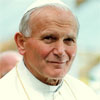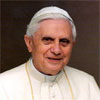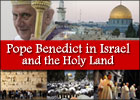ROME (CNS) -- Israeli ambassadors to the Vatican have a tradition of being press-friendly, and Mordechay Lewy is no exception.Ambassador Lewy also took the opportunity to address some questions regarding the status of Christians in the Holy Land and concerns expressed over their freedom of passage:Three days after presenting his credentials to Pope Benedict XVI, Lewy sat down with six Vatican journalists for a conversation at the Israeli Embassy in Rome's Parioli neighborhood.
Over coffee and cookies May 15 he chatted about his new job and did a little parsing of the pope's speech, which was handed to him at the credentials ceremony.
Lewy left no doubt that he relishes the role of ambassador to the Holy See. He said that when diplomatic relations between the Vatican and Israel were established in 1993 he told himself, "That's a job for me." He's had a long interest in the history of religion in the Middle East. ...
One church complaint in recent years has been a tightening of entry visas for church personnel working in Israeli territory. Lewy said the stricter policy was the result of the many suicide bombings during the second intifada that began in 2000.The ambassador said Eastern churches in the Holy Land often have personnel coming from countries like Syria, Iraq and Lebanon, so they are going to be carefully checked. Those whose job it is to protect the country view it simply as a security issue, he said.
"I see a clergyman. The security supervisor sees a Syrian," he said.
When it was pointed out that Christians have not carried out suicide bombings, the ambassador recalled the case of Melkite Archbishop Hilarion Capucci, a Syrian prelate arrested by Israel in 1974 and charged with running guns for terrorists but freed under Vatican pressure.
"It was a long time ago, but this remains in the collective memory. It did a lot of harm," Lewy said.








